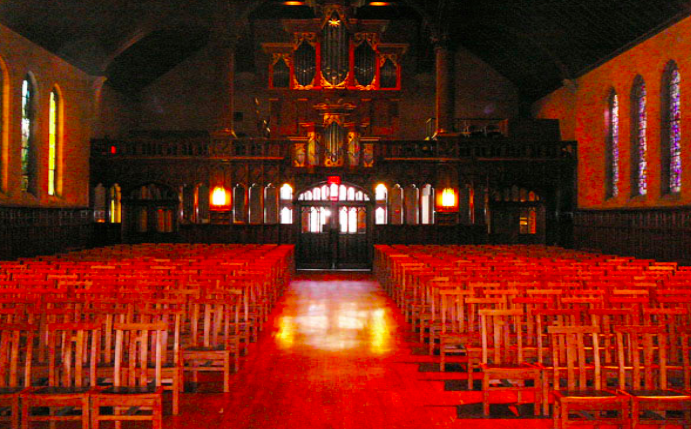Editor’s note:
Due to confidentiality reasons stipulated by the College, the names of candidates could not be published. The candidate interviewed for this article will not be addressed by name.
In continuation of the search for the new Dean of Religious and Spiritual Life, the College hosted three finalists for the position over the past week. The search for a new dean has been ongoing for over two years after President Kim Bottomly announced Dean Victor Kazanjian’s departure in April 2013. Since then, a search committee was formed to find a new dean, but faced setbacks as the candidates who were offered the position did not accept.
This year, the search committee selected three candidates to visit Wellesley’s campus and meet with students, faculty and administrators. Each candidate met with the Multifaith Council and had a one-hour window to interact with members of the Wellesley community. The Multifaith Council is a student group comprised of 16 religious and secular students. The students discuss multifaith issues, including spirituality and wellness, and more abstract topics such as asking “Does prayer matter?”.
One candidate was involved in a multifaith community in college. She had begun to lose hope, since she saw that there was always more improvements to be made and more community service to be done. However, she found comfort in the United Methodist Church, where she was able to regain hope.
“By participating in the interfaith community, I had the hope and the social justice that I wanted,” she said.
She hopes to use her experience to enhance Wellesley’s spiritual life and interfaith community. She currently works at a large university where she acts as a pastor, an activist and a scholar. She emphasized the importance of working with college students.
“It’s important to work with college students because the four years of college are transformative years in a person’s life. This could help students connect with their own identities and a community so they can build relationships across difference,” she stated.
The candidate noted that she was especially interested in working at Wellesley because of the contrast it would provide after working at a large research institution. In comparison, Wellesley is a much smaller liberal arts college, where students are more likely to focus on learning about differences of others and engaging in faith.
“I do a lot of broad work, which includes a lot of administrative work. I want to come to Wellesley to be able to do something deeper,” she added.
At Wellesley, she seeks to foster religious literacy, support the building of relationships across difference and help students translate plans into actions. She believes that getting students to be literate and knowledgeable about other religions will lead to less shaming of others and a greater, more effective community allowing for concrete changes in the world. She emphasizes the effectiveness of travel in creating bonds between individuals with differences, since traveling creates liminal space between each other. By physically engaging in religious traditions together, students would be able to become closer, thus leading to better dialogue and communication.
Dean of Students Debra DeMeis believes the role of the Dean of Religious and Spiritual Life is a multi-faceted one and that the dean’s purpose is to serve the community. To ensure community feedback, an online feedback form was released.
During the past eight months, Annabel Beerel has served as the Interim Dean of Religious and Spiritual Life. Beerel has overseen several new initiatives in the Office of Religious and Spiritual Life (ORSL) during her tenure at Wellesley that reach beyond cornerstone events such as FlowerSundayandBaccalaureate.Beerelemphasizedthe role ORSL plays in supporting student mental health.
“I think the ORSL is an incredible gift to what Wellesley is doing, and I think the model that was created was appropriate for its time. My feeling is that the multifaith model has to change. It has to progress,” Beerel said. “I think we have to find more avenues that we can be more relevant to the students’ lives. I think we need to find ways to be inviting to students who haven’t figured out what faith really means yet.”
ORSL, however, is not a replacement for the Stone Center, the wellness center or residential life. Beerel stresses that ORSL is a resource not only for students of faith, but secular students as well.
ORSL also collaborated with the Office of Intercultural Education and the Committee for Political and Legislative Awareness to provide forums for dialogue between students. Events under this initiative include the recent dialogue “Sticks and Stones: The Semantics of Racial, Gender and Homophobic Slurs” and the panel “What is Freedom?,” which included an introduction by President Bottomly.
These lectures are part of a division-wide response to President Bottomly’s initiative to promote civil discourse on campus. In February, President Bottomly addressed the campus via email on how to foster an inclusive environment, and mentioned the tools and resources required to encourage productive dialogues, discussions and debates at Wellesley.
According to Beerel, the initiative to create more resources for productive dialogues is a priority, especially in reaction to recent protests staged by groups like Students for Justice for Palestine.
“Where I think ORSL can play a huge role is that we can be impartial — because that’s our role…we’ve got to find the middle ground, the impartial ground, to bring people together to have good dialogues, so that’s the next step,” Beerel said.
Following the candidates’ final interviews, DeMeis is hopeful the College will announce a new Dean of Religious and Spiritual Life before the end of finals period.
Photo courtesy of Wellesley College






